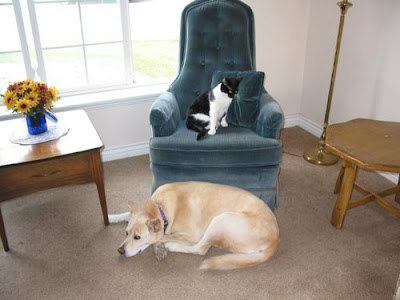February, 2012
A Vow to Be Discriminate
Okay, I realize that title doesn’t sound like a positive thing (especially if you overlook the “be”), so let me explain. If I am not discriminate, I am by definition indiscriminate. And that is something I do not wish to be.
I enjoy supporting fellow writers. Exchanging feedback on query letters, discussing the ins and outs of the business, offering chocolate when the rejections come in, swapping manuscripts for critique … all high on my agenda. I’m happy to support with more than my time, too. I’ve bought several books (some hard copy, some eBook, and some both) over the past couple of years by writers I know. Often these are in genres I don’t normally read a lot of, but in these cases I know the writer personally, and I know that the quality of writing is up to snuff, so I put my money behind them. These have been both traditionally published and self-published books.
But I will not support only because the “I know the writer” half of the equation is met. For one thing, I know too many, and half of them are self-publishing these days. Even at 99 cents or $3, that can add up.
More importantly, that “writing is up to snuff” part is critical. Reviewing books publicly can be super-sticky for a writer, especially one who’s still seeking the ever-elusive agent and publishing deal. My even-handed criticisms might be based more on my decades of experience as a reader, but it just looks bad to have even a hint of “bashing” others.
So the only vote of support I might have for some books comes in the form of currency and/or downloads. If I don’t believe a book is worthy, for whatever reason, I think it’s okay for me to withhold that vote. Certainly, I don’t think I do myself, my fellow writers, and most importantly readers any favors if I contribute to artificially inflating the rankings/visibility of a book I don’t believe in.
The brunt of this falls on the self-published works, it seems, because there are so many among my acquaintances, and because the self-publishing process has an inherent reduction in quality control. I am not anti-self-publishing. I’m still actively considering it for myself. But I’ve always been picky and demanding when it comes to books. Super-picky, some might say. (Mindy McGinnis has her own way of putting it, as those of you who know her can guess.) That pickiness isn’t going to change (and shouldn’t, in my opinion) just because I’ve talked to the author.
So I’ll continue to check samples and listen to the opinions of those I trust. If I believe in the work, you can bet I’ll put everything possible behind it. I’ve already pre-ordered the eBook for Sophie Perinot’s debut in less than two weeks, and I also plan to hit a brick-and-mortar store release day to buy a hard copy … maybe two. (Who has a birthday coming up and likes historical fiction?) I’m already earmarking money for several copies of Mindy McGinnis’s debut novel (which I was privileged to read and critique pre-querying), and that doesn’t come out until Fall 2013.
Am I too picky? Am I missing the boat of Authorial Solidarity? Have you ever found yourself stuck between a writer-friend who wants your support and your integrity that says, “This really wasn’t ready to go out into the world?” How do you handle it?
Speak up:
2 commentsHating Math
Last week I discussed my deep and abiding love for calculus. I understand not everyone feels this way, and in fact, some people don’t even have the slightest hint of positive feelings toward any kind of math at all. If you’re one of those, this post is for you.
I’m not going to tell you it’s wrong to feel that way, or that you have to change your mind. (I will ask that you try to refrain from saying, “Ugh, I hate math!” around children who are still forming their own opinions. Can’t tell you how many times I’ve had a student who tells me, “My mom/dad hates math and thinks it’s stupid and doesn’t think there’s any point to learning it.” Thanks for sabotaging my work, Mom/Dad.)
The people I know who hate math usually fall into a couple different categories. Some hate it because they really struggle with it no matter how hard they try. Sometimes a learning disability is involved. Sometimes nothing’s been diagnosed, but it’s clear their mind just isn’t wired for numbers.
I recently had a student like that. Brilliant artist and some strong writing skills, but math just Would. Not. Click. Bless her, though, she kept trying and was incredibly patient, no matter how many times she had to erase and rework a problem. And the thing is, she did make progress. Not at the same pace as her peers, but she improved, because she didn’t give up. She admitted she didn’t like it at all, but she hung in there.
I think most of the math-haters I know, however, fall into the second category: those who had at least one really bad math teacher, usually at a critical juncture in their math education. This often happens either at fractions in elementary school, or a little later somewhere around pre-algebra/algebra, when things start to get more abstract.
What’s the key to teachers not facilitating the mathematical downfall of their students? I think a big part is recognizing that many students are likely to hit a wall a those junctures, so the teacher needs to be extremely flexible. One way of explaining a tough concept isn’t likely to work for everyone. If a kid isn’t getting it, you have to look for another bridge to get them across.
Even bigger key—don’t make the kid feel stupid for not getting it right away. Kids are good enough at doing that on their own. They don’t need our help.
Many times, I’ve had adults watch me teach or listen to me discuss a lesson and say, “If I’d had a teacher like you, I probably would’ve liked math.”
Best compliment I can receive, but I don’t really mind the hating math. My goal with the haters in my class is for them to hate math a little less. Even if they still hate math, I try to make sure they like the class. Because if they do, their minds stay a little more open, and even if they don’t want to admit it, they learn.
Are you a math-hater? If so, which category do you fall into? Or is there another reason I haven’t accounted for here?
Speak up:
2 commentsLessons Learned from Shasta
Warning: This post is uncharacteristically sentimental. If you’re as much a cynic as I usually am, you may want to avert your eyes. And if you’ve ever said of a pet, “It’s just an animal,” and meant it, you might as well navigate away from this page right now.
In Fall 1997, my family got our first (and so far only) dog, a lab-husky mix we named Shasta. At over fourteen years old, her health had been deteriorating recently, and this past Tuesday, we made the decision to let her go.
As I reflected on our time with Shasta, I realized there are a lot of things we should learn from her. I’ll share a few of them here.
 |
| With ears like that, how could she NOT listen? |
#1 How you start is only a small hint of how you’ll end up.
The day we got Shasta, we had to go to PetSmart to get some particular supplies, so we brought her along. I could cuddle her to my chest with one hand. Hard to believe her puppy size was smaller than her adult-sized head.
#2 Listening is a skill that must be learned.
As first-time dog owners, training Shasta had a bit of a learning curve. She didn’t really want to listen at first. When she wanted to do something, she wanted to do it, whether we told her differently or not. Eventually, though, she figured it out. She wasn’t perfect, but most of the time she did all right.
#3 Sometimes you lead; sometimes you follow.
Related to training/learning … When she was young, Shasta really lived up to her husky nature during walks. She wanted to PULL you along the whole way. (We often wondered what would happen if we strapped on a pair of rollerblades and took her out, but decided it would be unwise.) Usually, she’d settle down a bit partway through the walk and stay at our side. As she got older, we were the ones coaxing her along.
 |
| Miracle: Not Shasta tolerating Chia, but Chia tolerating the dog. |
#4 Don’t believe all the stereotypes.
Shasta grew up in a house full of cats. She got along with all of them (although they didn’t all get along with her). To Shasta, the cats of the family were friends. On the other hand, she did chase any cat that wandered into the backyard.
#5 There are some things you just can’t be.
Shasta really, really wanted to be a lap-dog. It was apparent for all of us, but especially with my dad. She wanted to climb right up there and get cozy. But considering her size (60+ lbs), it wasn’t going to happen. Likewise, I’ll never be a supermodel. And that’s okay.
 |
| Sadie and her dog. Or Shasta and her kitty. |
#6 Don’t be afraid of unusual types. You might be best friends. (Sidenote: Remember you’re setting an example.)
Remember the cats of the family? Sadie is the only one who came along after Shasta, so she grew up with a dog around. They loved each other. Sadie would get up on her hind legs to rub up against Shasta’s chest (Shasta being MUCH taller than she is.) Related to the sidenote, I swear Sadie copied Shasta’s walk.
#7 Do your own thing; it’s okay if a few others think you’re crazy.
Again showing her husky blood ran deep, Shasta loved the snow. When there were a few fresh inches of powder out in the yard, she’d bound through it, burrow her nose under it and fling it in the air. Then she’d curl up in it like it was the comfiest bed ever.
 |
| I could never look that peaceful while lying on snow. |
#8 We all have faults.
Shasta’s fur looked short, but it was thick, and it shed like you wouldn’t believe. Not her fault—she obviously couldn’t help it—but my family really should have bought stock in lint-removal devices of all types years ago. Between her and the cats, it was hopeless.
 |
| That’s apparently only half the fur from one brushing session. |
#9 Dream big.
You’ve all seen a sleeping dog dream, right? Their paws twitch like they’re running, their little yips. You get the feeling they’re living that dream.
#10 Sometimes you resist things that end up being good for you.
When we first got Shasta, she wasn’t crazy about her leash. We’d be trying to get her safely across the street, and she’d twist around to grab the leash in her mouth and play tug-o-war with us. Not good.
This one had a flip-side from the human angle, too. My sister wanted a dog all growing up, but Dad said no because we didn’t have a fenced-in backyard. In ’97, we moved, and had the fenced-in yard. So Dad had to (grudgingly) give in.
In the end, no one loved Shasta like Dad, and it was mutual.
We’ll miss her.
Speak up:
5 commentsGung-Ho About Grammar
If I’ve ever critiqued or beta-read for you, you probably noticed that I can get nit-picky with grammar when I want to. For me, it’s just part of my OCD, perfectionist nature. I see an error, and it’s like being jacked into an electric fence unless I do something to fix it.
Okay, maybe not that bad. But I used to be almost that bad. When we did diagramming sentences in ninth grade, I didn’t understand why so many of my classmates were complaining. For the most part, it was easy, I thought. What’s the big deal? My brain just seemed to be wired for it.
(Before anyone starts sending me hate-mail, realize that at the time I also thought creative writing was a kind of magic I would never possess. So, you know, some things balance out.)
When I started teaching deaf students, I really began to understand just how wacky English grammar is. No wonder even those of us who hear and speak the language every day screw it up! My students will master one rule only to discover there are twenty more exceptions they have to figure out.
Even with my super-grammar-skillz, there are a few things that still hang me up. I only just got a solid handle on the whole lay-vs-lie thing. (Related concepts, and the past tense of one is the present tense of the other? Whose idea was that?)
Further-vs-farther? I know the rule. Farther is for distance; further is for degree. But I swear I’ve come across a few places where I could argue it fits either condition. (And of course, I can’t come up with an example right now. If I ever do, I’ll throw it in an edit or the comments.)
“If it were” vs “If it was”? I remember being told if it actually happened that way it was one, but if the circumstance was never true, it’s the other … something like that. I have a really hard time wrapping my head around that one and all related forms, so if you have several super-clear illustrations to pass along, I’d be hugely grateful.
The nice thing is, grammar isn’t so hard to learn. (Particularly compared to some other aspects of writing. I can’t begin to tell you how to develop more voice in your manuscript, but I can help you understand the proper way to use semicolons.)
What about you? Any particular nuances of grammar that you just can’t nail? Any that you KNOW, but find you have to keep a close eye on yourself not to slip?
Speak up:
6 commentsConfessions of a Math Geek
I love calculus.
If there’s anything that cements and seals my “I’m a Geek” badge, that statement is it. And I’m okay with that.
Do you know what you can do with calculus? I’ve found most people who never took calculus have no idea what it involves, so here are some highlights.
You can find the slope of curves. Remember slope? You learned about it in algebra, probably with some variety of “rise-over-run.” It tells you how steep a straight line is, the rate at which it increases or decreases.
Well, with calculus, you can find that rate at a specific point on a curvy line. It’s starts off a little ugly and scary, with a formula that looks like this (or a variation on it):
After laboring through several problems with this not-so-fun process, your teacher reveals that there are ridiculously easy shortcuts.
You want to kill your teacher. (I warn my students ahead of time that this will happen.) Then you get over it and get to work.
This may not sound that useful, but think about all the things that involve rates. Velocity, acceleration, how quickly something is growing or shrinking, etc.
Later on, you learn how to find the area under curves. Again, it starts with a slightly complex process that you soon simplify (until it gets harder again). This concept extends to taking the graph of an equation, imagining that you’re spinning it around an axis, and finding the volume of that 3-D shape.
There are ways this is useful, too. But from the time I learned it, I thought it was just insanely cool all by itself.
Yup. A geek, for sure.
You know what’s even stranger? That slope-finding process and the area-finding process turn out to be inverses of each other. Totally unexpected, but it’s part of what makes it easier in the long run.
Anyone else have a topic they learned about in school that just makes them geek out to an irrational degree? A certain period in history, or a concept in science? It’s safe to share. All geeks are welcome here.
Speak up:
3 commentsFeeling the Funk
So, Valentine’s Day was this week, and …
… well, moving on.
Let’s face it. There are times you feel considerably less than awesome. This isn’t a pity-party—not a full-blown one, anyway—but it’s an acknowledgement of these feelings. They’re real, and they’re not fun. But acknowledging their reality (without going overboard) often helps me move on.
People talk about surrounding yourself with greatness. There are many benefits to this, but there’s at least one glaring downside. When you’re surrounded by the super-awesome, you really start to notice the ways you’re not-quite-so-awesome.
Then there’s the even more awkward position: When those looking up to your super-awesome friends assume you’re one of them.
“No, really, I’m just another wannabe trying to slog it out like you guys.”
But wait, I can’t say that. I’ll sound like a jerk to people who are struggling even more than I am. So I’ll just smile and play along.
And then I feel like a fraud, too.
Gah.
So, here’s the thing. I can dwell on this “I’m not as cool as my friends” feeling, but I prefer the other option.
I can work my butt off until I reach their level of awesome. Maybe I won’t get there, but even just by trying, surely I’ll get closer. And improvement’s always a good thing.

